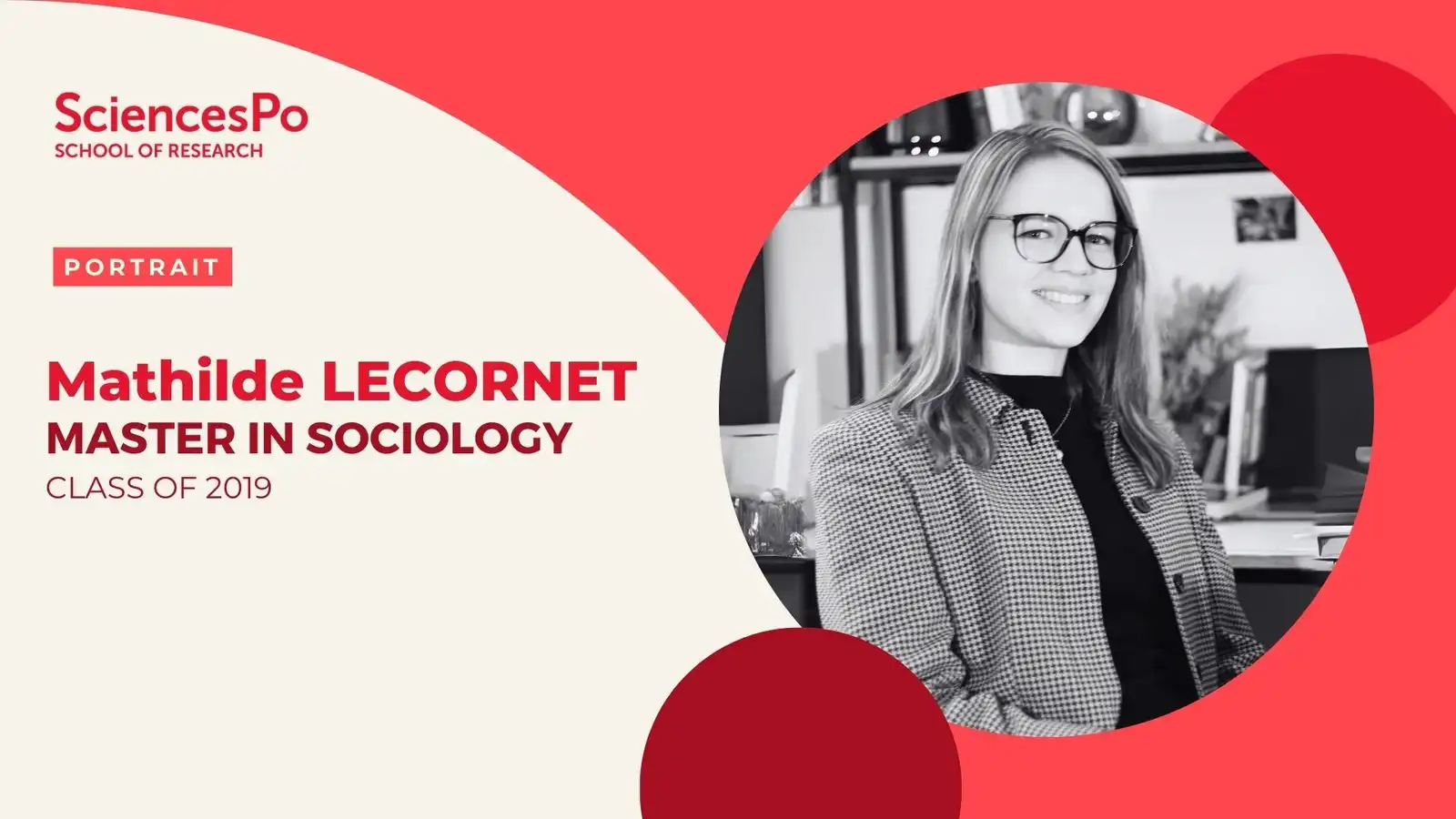Home>Portrait of Mathilde Lecornet
19.08.2024
Portrait of Mathilde Lecornet
CAN YOU TELL US ABOUT YOUR ACADEMIC CAREER? HOW DID YOUR INTEREST IN SOCIOLOGY COME ABOUT?
After a scientific baccalauréat, I entered a preparatory class for the grandes écoles B/L (literature and social sciences), which enabled me to prepare for the entrance exam to Sciences Po.
B/L (literature and social sciences), which enabled me to prepare for the entrance exam to Sciences Po. My encounter with sociology as an academic discipline was decisive, as my first love was literature.
I've always wondered about the world around me and what underpins social relations, values, hierarchies, the place of minorities and the distribution of wealth. With sociology, I appreciate the disenchantment with the world that enables us to understand it in all its complexity while freeing ourselves from preconceived ideas.
When I left khâgne, I refused to give up literature: I took a degree at the Sorbonne in parallel with my master's, and poetry joined sociology as the subject of my dissertation.
WHAT HAVE YOUR YEARS AT THE SCHOOL OF RESEARCH MEANT TO YOU? WHAT MEMORIES DO YOU HAVE OF YOUR SCHOOL AND YOUR YEAR?
The School of Researche was a rich learning experience in many ways. I really
very much appreciated the diversity of the curriculum, which enabled me to study the sociology of gender, science and public action. I also think it's important that students are trained in qualitative and quantitative methods, and the method seminars were crucial to understanding how social science research is done, which is needed in so many professions.
The classes in the sociology master's programme are fairly small, which
This means that you get to know your fellow students better, and with them their research topics, their developments, their doubts and their methodological or theoretical reflections. On a more personal level, I made friendships that have grown stronger over the years and are still very important today.

« The School of Researche was a rich learning experience in many ways. I really very much appreciated the diversity of the curriculum, which enabled me to study the sociology of gender, science and public action. I also think it's important that students are trained in qualitative and quantitative methods, and the method seminars were crucial to understanding how social science research is done, which is needed in so many professions. »
Mathilde Lecornet
Management of cultural projects, communication, relations with authors, publishers and organisers of literary events for Printemps des Poètes
WHICH TEACHER HAS HAD THE BIGGEST IMPACT ON YOU?
My dissertation supervisor, Pierre François, encouraged me to delve deeper into a subject that was still confidential and linked two disciplines - sociology and the worlds of art - between which there was still little dialogue. I spent many fascinating hours with him, dissecting the career paths of contemporary poets and studying the norms that govern the literary world.
WHAT IS YOUR CURRENT POSITION?
I work for Printemps des Poètes, an organisation dedicated to promoting poetry on a national scale and in French-speaking networks. I carry out a wide range of tasks, from managing cultural projects to communications and relations with authors, publishers and organisers of literary events.
WHAT WERE THE MAIN STAGES IN THE DEVELOPMENT OF YOUR CAREER PLAN?
I've never really had a career plan, having been lucky enough to love studying and unlucky enough to be interested in too many things to choose one very early on.
When I left Sciences Po, I said to myself that there was probably something to be done with the uniqueness of my background and I turned towards culture in the broadest sense, always trying to use my background in sociology. I rounded off my university studies with a course in administration to improve my skills in the financial and legal aspects of managing cultural projects. Finally, I had the opportunity to join Printemps des Poètes, which enabled me to combine my skills as a sociologist, my taste for contact with the public and my passion for literature.
QUELLES ONT ÉTÉ LES CONTRIBUTIONS DE VOTRE FORMATION À LA FONCTION
QUE VOUS OCCUPEZ AUJOURD'HUI ?
My training in sociology has been instrumental in shaping me as a person and as a professional, the latter obviously stemming from the former.
Sociology taught me to be wary of the many biases of thought that can be encountered in the workplace, to understand the mechanisms underlying the way an organisation works, and it gave me a rigour of analysis that is useful on a day-to-day basis.
I still use the methods I learnt during my Masters to carry out surveys, summaries and other assessments that are essential for managing cultural projects, so that I can act in the right places.
WOULD YOU HAVE ANY ADVICE FOR A STUDENT WHO WANTS TO MOVE INTO THE SECTOR IN WHICH YOU WORK TODAY?
Exchanging as much as possible.
Career paths are often very different in this field, and it is sometimes surprising to see the bridges that have been built from one training course to another job, or from one company to another.
For those of you who think that working in culture is difficult, I'd advise you to listen to the stories of people who have succeeded: it helps to put things into perspective and to project yourself onto your own career path. It's also a way of getting a better grasp of all the structures, institutions and jobs that you don't yet know about, in a sector where the image you have of a job often has little to do with its actual reality.
Useful links
